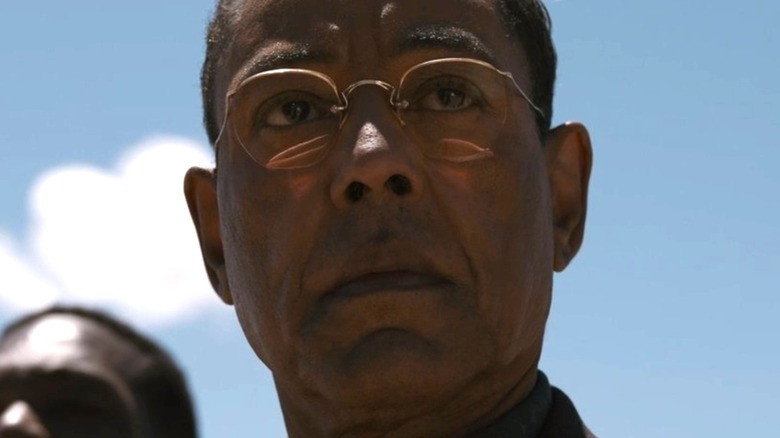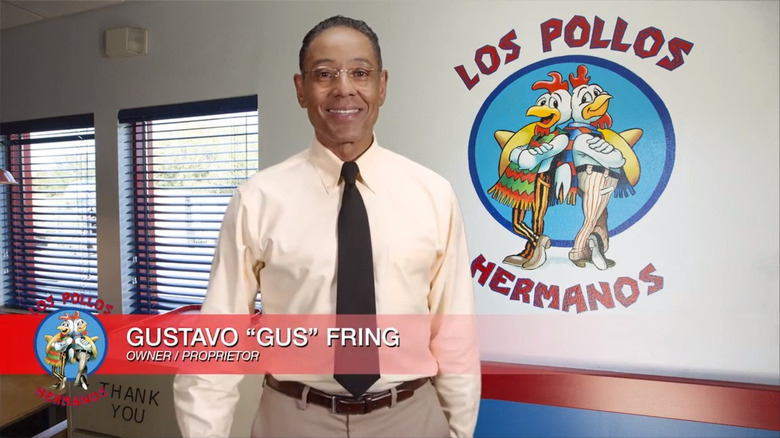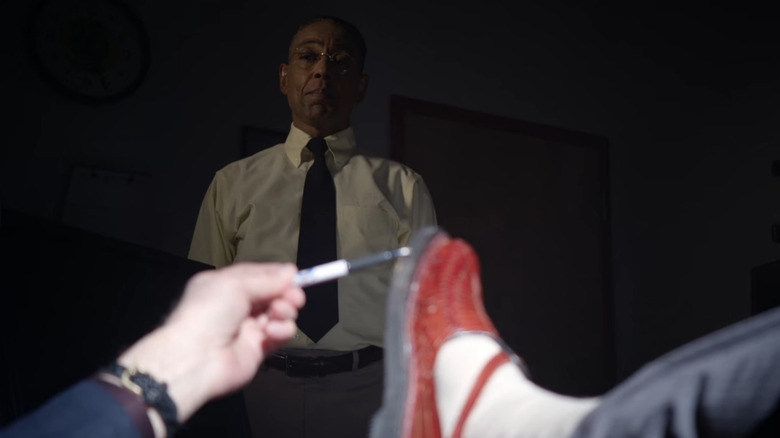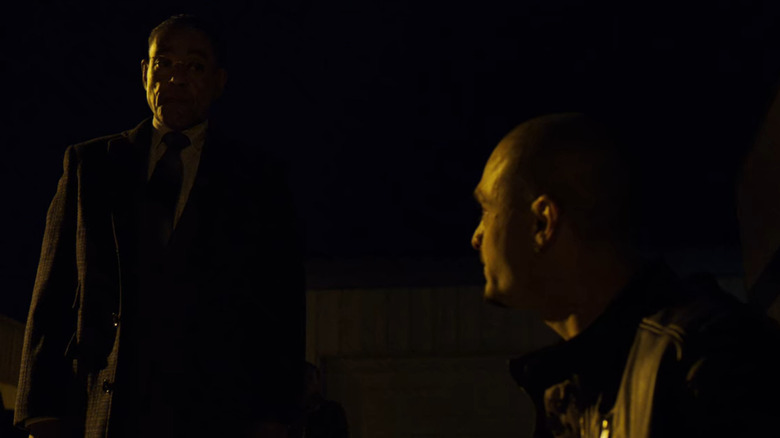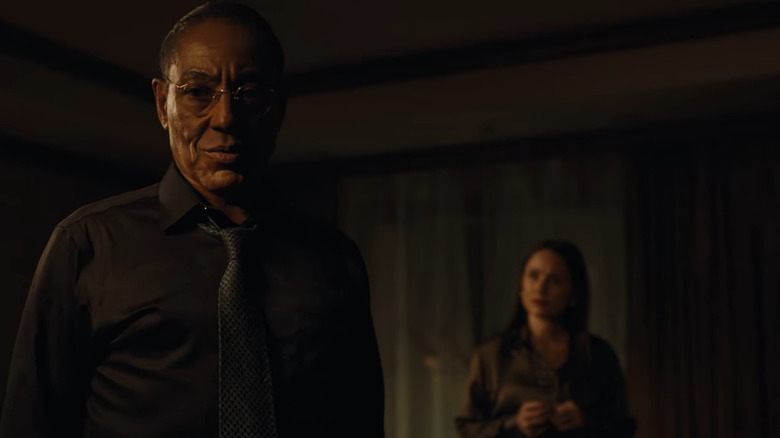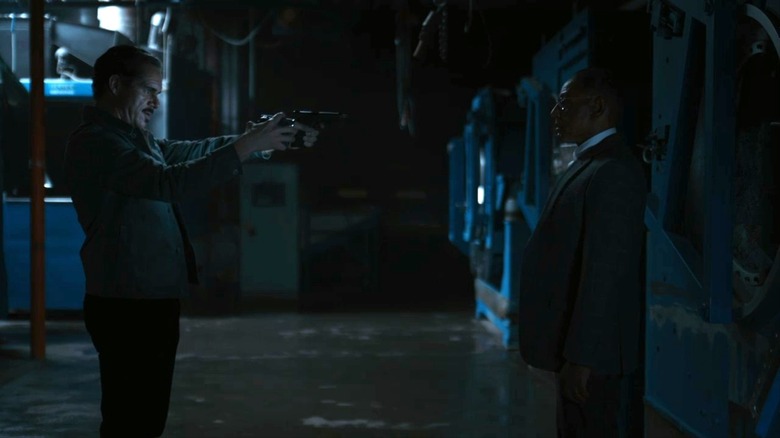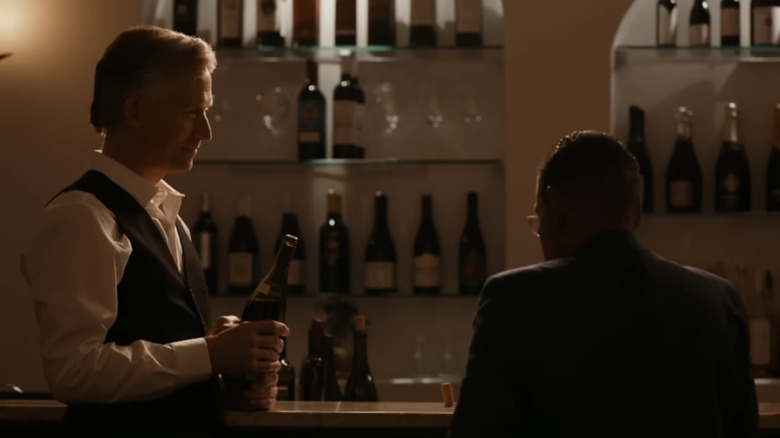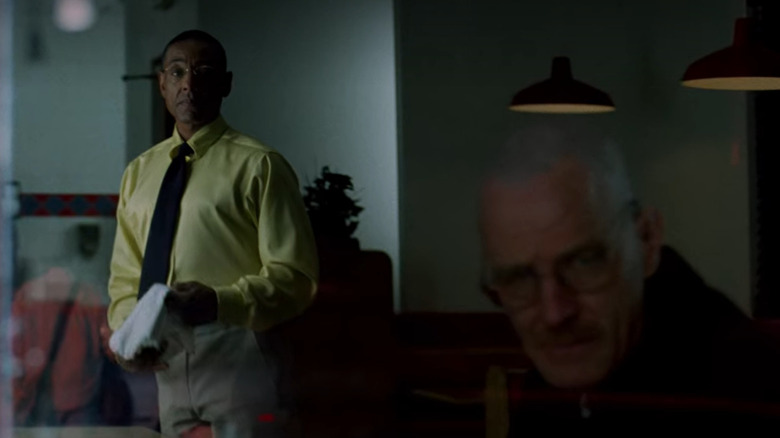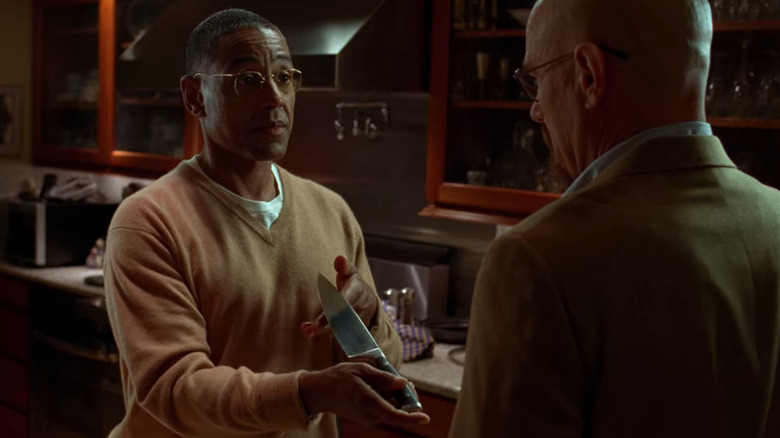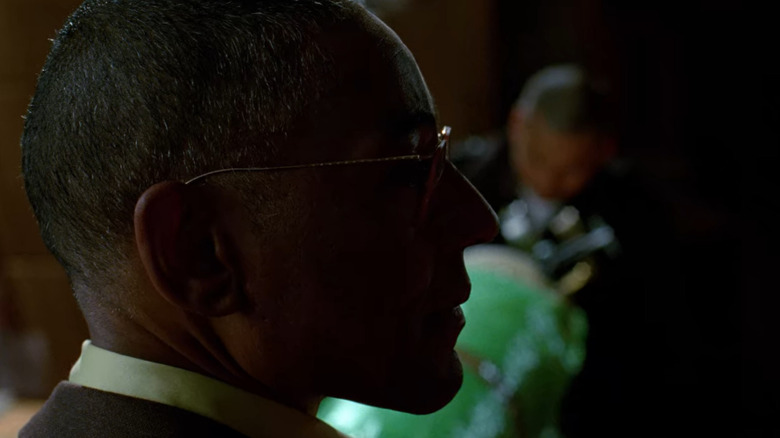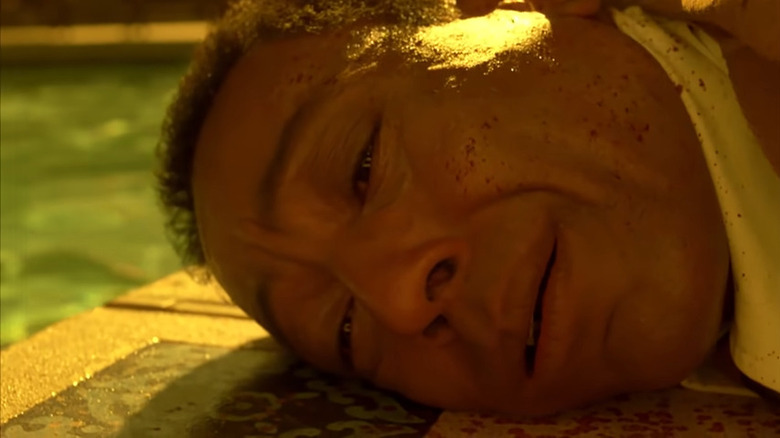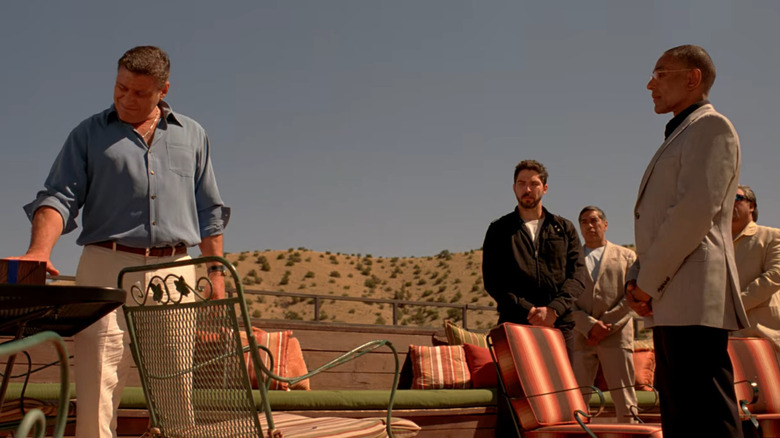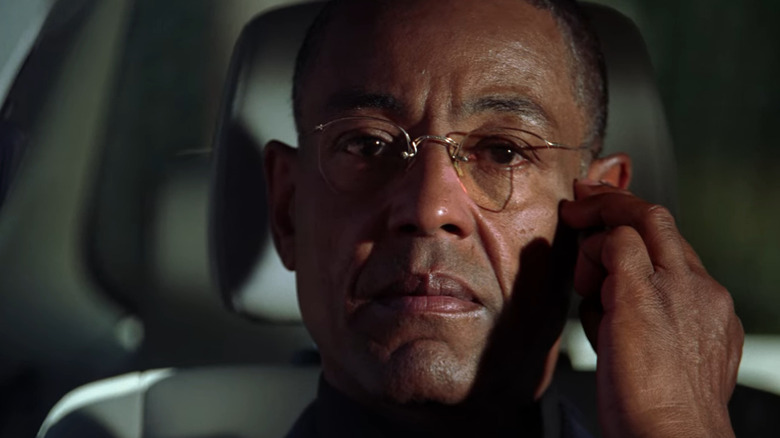Gus Fring's 12 Best Moments In Breaking Bad And Better Call Saul
AMC's "Breaking Bad" and its prequel spinoff "Better Call Saul" are well-known for creating complicated villains and heroes alike, with the moral gray area starting relatively small in the first episodes and then expanding across both series until it seems that it's all there is. At the top of the list of compelling characters is fan-favorite antagonist Gustavo Fring, a wealthy restaurant owner and upstanding community member who does incredible acts of philanthropy by day while devastating communities through his illegal drug operations by night.
A key villain in both series, Fring walks the uncomfortable line between remorseless sadist and tragic fallen man. Undergoing jaw-dropping horrors only fed his own ruthless nature, making him easily one of the most intriguing characters of the franchise. Brought to terrifying life by the charismatic Giancarlo Esposito, Fring is an all-timer in the "villains you can't help but love" category.
With "Breaking Bad" and "Better Call Saul" both in the bag, Fring's story is finally over. Looking back on his trail of carnage over the years, that might be for the best, but it also serves as a reminder why "the Chicken Man" captivated the fandom enough to warrant his role as one of the scariest villains of either series (right after "Breaking Bad" protagonist, Walter White, of course)! And to celebrate this complicated, terrifying figure, we're going to take a look back at Gus Fring's very best moments from both series — from bloody carnage to those rare human moments.
The Los Pollos Hermanos training videos
During the airing of "Better Call Saul," AMC aired 36 mini-episodes as part of its humorous "Employee Training" series. Giving a glimpse at how the characters conducted themselves in their day-to-day professional lives, the series pulled off that perfect mix of cringe, tragedy, and humor that made "Breaking Bad" and "Better Call Saul" the megahits they are. Entries included "Ethics Training With Kim Wexler" and "Madrigal Electromotive Security Training With Mike Ehrmantraut," but it doesn't get better than "Los Pollos Hermanos Employee Training," hosted by "Gustavo — but you can call me Gus!"
Nowhere is the disconnect between Gus' people-pleasing customer service as the proud owner of a thriving fast food chain and his more upsetting criminal activities more apparent than in these hysterical shorts. Taking new trainees and franchise hopefuls through the ins and outs of the restaurant — including everything from shipping and receiving protocol to communication and teamwork — Gus speaks with the authoritative tone that rocketed him to the top of his own criminal empire. Leaning into his methodical side, the seedy underbelly of Gus' drug empire is always just beneath the surface as he explains how important it is to keep an unassailable public-facing image.
The "Employee Training" videos are low-stakes and non-essential, but they're great for the humor they provide and the way they show the people you meet every day can have complex inner worlds you know nothing about. Especially Gus Fring.
When a plan comes together
In "Better Call Saul," Gus didn't turn up until Season 3, but as always, he made quite an entrance when he finally appeared. For those who watched "Breaking Bad," the longstanding rivalry between Gus and Hector Salamanca — the unrepentant killer who cost Gus his love, Max — was one of the defining conflicts of the series. Though ultimately neither man emerged as the true victor in their bloody battle, it was one that spanned years and grew to define much of either man's story. Their conflict is indisputably fascinating, with the impassive, cold Hector making the perfect foil to the impeccable but equally ruthless Gus.
In Season 3's "Sabrosito," Hector, Nacho, and Arturo arrive at Los Pollos Hermanos, intimidating the staff and forcing Gus to agree to facilitating the transport of Hector's drugs, never suspecting that this is all a part of Gus' masterful revenge plan against Hector. However, the greatest moment of the episode is when Gus is forced to make amends with the restaurant staff. Offering them gracious overtime pay and making it clear he'll cover costs for any resultant therapy required by his staff, Gus' commitment to his people is clear.
When an assistant manager asks who the men were, Gus uses the moment to turn the tide firmly in his own favor, weaving a heroic tale in which he forced armed thugs to back down. Even knowing the more sinister backstory, it's hard not to feel inspired by Gus' speech.
The end of the road for Arturo
One of the best things about Gus as an antagonist is that he'll spend several episodes orchestrating plans so that it's easy to get caught up in his Machiavellian sleight-of-hand. Right as you begin to forget his more sinister motivations, he'll jump into action and cause tremendous acts of violence as casually as he would serve up a plate of curly fries at Los Pollos Hermanos. That is exactly what happens in the Season 4 "Better Call Saul" episode "Breathe."
Discovering that Hector is comatose, Gus steps in to oversee his care, paying for a specialist to bring him back to consciousness. Though the hospital staff see this as an act of kindness, the truth is that Gus simply requires Hector to be kept alive so that he'll be aware of the wave of carnage he's wrought on everyone Hector ever knew. Then, realizing that Nacho actually tried to kill Hector by switching medication, Gus uses this as leverage when he brutally murders Arturo and enlists Nacho into his service. One of the more tragic victims of Gus' cruelty, the unfortunate Nacho is forced to watch his partner suffocate as Gus cruelly barks, "From now on, you are mine."
Los Pollos Hermanos has got to go
As part of Nacho's work for Gus, he's running jobs for both Fring and Hector's nephew, Lalo. The younger Salamanca shares Gus' overall charms, albeit manifesting in markedly different ways, making them a compelling match-up. With his uncle mostly incapacitated, Lalo steps up, becoming a major threat to Gus. In standard Fring fashion, Gus steps back and allows his complicated web to do his work as, episode by episode, Lalo weaves his own downfall.
Gus' 4D chess moves are on full display in Season 5's "JMM." Here, we watch him satisfying corporate interests, where he attends a meeting among higher-ups in the Madrigal corporation. Gus impresses them with his seasoned curly fries, and later, he meets privately with the CEO, who's stressed by the threat Lalo poses to the completion of a meth lab they're funding. When the CEO begins to panic, Gus assures him that he's very much in control and that there's nothing to worry about.
Granted, Lalo does want Nacho to blow up a Los Pollos Hermanos location to send a message to Gus. However, as Nacho is in Gus' pocket, he tells him of Lalo's plans. Rather than conceding or running damage control, Gus agrees that blowing up the Los Lunas location is for the best. We watch as the mastermind oversees the explosion himself — you can do a lot with a bit of grease — allowing Lalo to enjoy a moment of triumph before his inevitable fall.
Fring vs. Lalo
Kicking off the mid-season premiere of "Better Call Saul" Season 6, "Point and Shoot" gives audiences the conclusion to the Lalo Salamanca vs. Gus Fring battle. With Jimmy McGill and Kim Wexler celebrating what they believe to be a moment of triumph, their night is interrupted when Lalo kills Howard Hamlin and forces Kim to go murder Gus. Of course, she's quickly intercepted by Mike, who sends men to Jimmy's apartment ... although Lalo is long gone. It was all just a ploy to draw Mike and his goons away from Lalo's true target.
Understanding that Kim's presence is merely a distraction, Gus recognizes that Lalo is attempting to prove his treachery against the cartel. At first, Lalo has the upper hand, ambushing Gus and forcing him to reveal his hidden superlab. This basement facility will play a major role in "Breaking Bad" when Walter White takes over cooking for Fring's empire, but in the moment, Lalo believes he will put a stop to its completion.
However, after leading Lalo into the superlab, Gus causes a power outage. Grabbing a pistol he'd previously hidden in a secret location, he fires into the darkness. While Gus is wounded, Lalo is killed, giving one last hearty laugh as the life goes out of him. Gus' wound is treated privately, marking an end to his feud with Lalo. However, as we know from "Breaking Bad," this episode and the superlab ultimately play a major part in his eventual downfall.
A glimpse of happiness
We bid farewell to prequel-era Gus in "Fun and Games." Gus is called to a meeting at Don Eladio's home, which "Breaking Bad" viewers will recognize as the exact place that kicked off his epic quest of vengeance to begin with when Hector shot Max. Here, Hector accuses Gus of killing Lalo, which Gus responds to simply by saying the accusation doesn't dignify a reply. Hector is dismissed as senile while Don Eladio is goaded into a false sense of security.
Afterward, Gus goes to unwind at a local wine bar. Sharing a moment of chemistry with the sommelier, David, Gus is more at ease than we've ever seen him. When David goes to fetch a bottle of wine in hopes of continuing their conversation, Gus reflects, then promptly finishes his glass and leaves. Asking a server to inform David that he's regretfully been called away, this is the last we see of Gus in "Better Call Saul."
Much of Gus' personal life is left open to interpretation, but the subtext of this scene implies that David represents a moment in which Gus might've walked away from his seemingly unending schemes and found genuine happiness outside of his trauma over Max's brutal death. Yet, as with so many characters of the franchise, Gus is unable to let go, with this scene showing nothing more than a glimmer of what might've been.
Gus meets Walter White
Gus Fring's official first appearance on "Breaking Bad" is in the episode "Mandala," and it's a wild ride. While most of the plot revolves around the complex dynamic between Jesse Pinkman and Walter White, Gus only heightens the tension when he shows up. Walt attempts to meet with Gus at Los Pollos Hermanos without actually knowing who he's meeting, but Jesse arrives late and high. As for the "contact," he's a no-show, and Walt is later informed he no longer wishes to do business with him.
This leads to Walt staking claim over a booth and waiting it out, ultimately piecing together that he's there to meet the restaurant owner, Gus. While Walt is eager for another chance, Gus is plain that he sees little connection between the two, as he himself is meticulous and careful while Walt is clearly aligned with addicts. Walt assures him that Jesse is in his control, but Gus is unwilling to budge.
However, in a change of heart, Walt receives a last-minute call from Gus asking for a massive amount of meth, stating he'll pay an exorbitant sum for its delivery. This kicks off the catastrophic partnership between Walt and Gus, and it's an all-timer for both of them. The stark differences between the two are never more on display than here, but their mutual attention to quality bonds them. Despite Gus' avoidance of loose ends, aligning with Walt is inarguably one of the mistakes that eventually dooms him.
Gus at home
Gus' role in Season 3's "Abiquiu" is comparatively minor, but it remains one of his most impactful moments on the show. Gus' personal life is almost completely left to the audience's imagination, with his early life in Chile almost a complete mystery. Likewise, we know very little about how he spends his days, what his relationships with his family members are like, or what he does in his off-hours.
However, we do get to see his digs when Walter arrives at Gus' beautiful yet simple home – luxurious, tidy, but not extravagant. The kitchen is perfection, with spacious counters and a lived-in feel. Gus is amiable and conversational, inviting Walt to come help him cook. This is easily the most relaxed we ever see him, and he shares short anecdotes, signifying that he has children that refuse to eat his authentic Chilean cuisine, noting, "You know what that's like." He extends the olive branch to Walt in the form of a knife, picking it up and holding it in a trusting and vulnerable way, leaving himself open to attack, which Walt clearly considers.
Gus appears willing to mentor Walt, noting that he himself made many mistakes starting out. When he notes the sentimental nature of food, he listens raptly as Walt offers a scientific chemical explanation for it, identifying a lack of sentimentality in the other man. It's one of the most fascinating moments of the show, watching these two titans gauge each other over dinner.
The box cutter scene
In Season 4's "Box Cutter," we see the aftermath of Gale Boetticher's murder at the hands of Jesse. With Walt and Jesse being held captive by Mike, henchman Victor reveals he's been watching them cook in hopes of proving his value to Gus. When Fring shows up, he methodically moves around the lab, picking up a box cutter and donning a hazmat suit. Walt, tied to a chair, rambles desperately in hopes of deescalating the situation. When Victor says he knows their recipe, Walt is disgusted, asking Gus if this is what he is really looking for in a partner.
Stepping up next to Victor, Gus continues making cold eye contact with Walt ... and in a shocking move, Gus reaches over and gashes Victor's neck with the box cutter, splattering blood and holding Victor as he dies. He removes the protective gear, now dripping with blood, and returns to his civilian clothes as Walter and Jesse sputter with surprise. Though they now feel Gus will allow them to live due to their value to him as manufacturers, Jesse observes he might simply make them wish they were dead.
Even before this moment, there was no denying Gus was a scary guy, but this cemented him as an A-lister in the TV villain hall of fame. Normally outwardly steady, here we see the flip side of his calm as he murders a loyal employee without so much as flinching.
Gus Fring's origin story
Up until the Season 4 episode "Hermanos," we had very little insight as to what made Gus tick. Here, we see a glimpse, and it isn't pretty. As he's questioned due to his affiliation with the murdered Gale, the authorities reveal there's no record of anyone with his name having been born in Chile. Gus quickly explains that he immigrated during Pinochet's dictatorship, suggesting that poor record keeping was a major failing of the ruler and urging them to keep digging.
This leads to a flashback in which we meet his partner and apparent lover Max, a meth cook who Gus put through college in order to create his own top-notch chemist. Gus and Max meet with Don Eladio at the estate that will become a recurring set for the series. As they attempt to negotiate with the cartel, the drug lords ask why Gus is present if Max is the manufacturer. As Max jumps to Gus' defense, Hector shoots Max in the head, his blood splattering across a stunned Gus' face.
Hector forces Gus to stare into Max's lifeless eyes while Eladio explains to him that the only reason he's still alive is because he knows who Gus is, implying a larger history in Chile that's as of yet unrevealed. This is the moment that broke Gus as a person, and every other time we see him, he is simply acting out the drawn out anger from the trauma he undergoes here.
The poisoned chalice
One of the most memorable "Breaking Bad" episodes, Season 4's "Salud" shows Gus' decades-long revenge come to its terrifying end. When Jesse, Mike, and Gus are all invited to Don Eladio's house, they enjoy the sunshine by the pool as Gus and Eladio apparently make peace. Offering a token of appreciation in the form of a bottle of tequila, Gus and Eladio both drink, as do many of the don's men. However, out of sight, Gus has taken a pill to fortify himself against the inevitable effects of the poison he's laced the tequila with.
As Eladio and his men begin dropping like flies, Gus induces vomiting and survives, though the poison still affects him. Despite the fact that he's very nearly on death's door himself, he screams out threats to Eladio's remaining men, declaring their leader dead and telling them that they have no reason to fight. Even as he's near collapsing, Gus cuts an intimidating figure, and the don's friends and employees flee the scene, and Mike, Jesse, and Gus barely escape with their lives.
This scene is one of the masterstrokes of "Breaking Bad," not only showing a brave and impressive side to Gus but offering some catharsis after we saw the greatest horror of his life visited upon him in the very location where he exacts his revenge. Though it's only downhill from here, this is the moment of triumph that Gus sacrificed everything to achieve, and it is epic.
Face-off, literally
Gus' final canonical appearance is in the "Breaking Bad" episode "Face Off," in which this beloved villain finally meets his doom. After avenging Max decades after the fact, all that's left for Gus is to tie up loose ends, the biggest of which is the man who actually pulled the trigger on Max, Hector Salamanca. However, Walter White is now involved in the plot against Gus, giving Hector an explosive that will let him bring Gus down with him on his next visit to Hector's retirement home.
An ongoing subplot of Gus' story is that he regularly tries to force Hector to look him in the eyes, which Hector unfailingly refuses to do. Here, the old man finally concedes, but it's immediately before he triggers the explosive that leads to both their deaths. Gus calmly walks out of the room after the explosion, apparently fine. However, the staff reacts in horror, and as the camera pans, we see what they see — half of Gus' face burned off with nothing but skull underneath. He collapses and dies.
Though Gus doesn't officially kill Hector, in seeking to inflict as much pain on the incapacitated man as possible, Gus succeeded and then some. With Gus' reason for living gone, it feels inevitable that his death would have come to him soon one way or another. Here, his end is both violent and poetic, much like the man himself.
